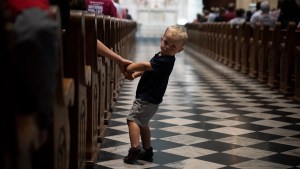The Psalmist prays in Psalm 8:
When I see the heavens, the work of your fingers,
the moon and the stars which you arranged,
what is man you that you should keep him in mind?
It is a prayer of wonder.
In one of his writings, Pope St. John Paul II says that “faced with the sacredness of life and of the human person, and before the marvels of the universe, wonder is the only appropriate attitude.” Which is why “wonder is the strongest expression of one’s self” (Msgr. Lorenzo Albacete). We suffer without wonder. “If we are devoid of wonder then we remain deaf to the sublime.” (Abraham Heschel) Unlike ideas “that lead to idols,” comments St. Gregory of Nyssa, “only wonder leads to knowing.”
Sofia Cavalletti, a biblical scholar who dedicated her life to the catechesis of children, reflected extensively on the importance of wonder in the life of faith. Wonder is proper to anyone who “has known how to live by beholding and contemplating the world surrounding them in such a way that reality has revealed ever widening horizons to them.” And this leads naturally to prayer.
When wonder becomes a fundamental attitude of our spirit it will confer a religious character to our whole life, because it makes us live with the consciousness of being plunged into an unfathomable and incommensurable reality.
What if we have lost our wonder? How can we get our wonder back? In the experience of Cavalletti, “the surest — and quickest — way for us to wonder is to fix your gaze undauntedly on the same object. One fine moment this object will seem to us — miraculously — as if we have never seen it before.” We can fix our gaze on a tabernacle, on a crucifix, on a statue of the Blessed Virgin Mary, on an icon, on an image of a saint, etc. We do so with the assurance that “the nature of wonder is situated ahead of us and attracts us with irresistible force toward the object of our astonishment; it makes us advance toward it, filled with enchantment.” Which erupts into prayer.
~
Follow Fr. Cameron’s series on prayer here.


